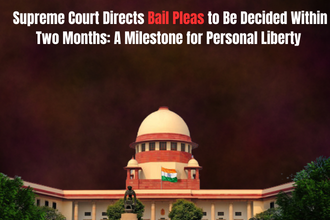In a historic ruling that strengthens the digital rights of persons with disabilities and acid attack survivors, the Supreme Court of India on April 30, 2025, declared that digital access is a fundamental right under Article 21 of the Constitution. The judgment is a major leap forward in recognizing the digital divide as a constitutional issue, and it mandates inclusive reforms in the Know Your Customer (KYC) process to ensure accessibility for individuals with visual impairments and facial disfigurements.
The decision was delivered by a Bench of Justices JB Pardiwala and R Mahadevan in response to two Public Interest Litigations (PILs) filed by accessibility activist Amar Jain and acid attack survivor Pragya Prasun, both of whom faced significant barriers in completing digital KYC procedures due to their disabilities.
Digital Access Now Part of Article 21: Right to Life
The Supreme Court categorically held that digital access is an intrinsic component of the fundamental right to life under Article 21 of the Constitution. It emphasized that equitable participation in modern economic and social life cannot occur without unhindered digital access.
The Court stated:
“In the contemporary era, where economic opportunities are increasingly dependent on digital access, Article 21 must be interpreted to include the right to digital access. The digital divide cannot lead to exclusion, especially of persons with disabilities and survivors of acid attacks.”
The Petitioners and Their Struggles
1. Amar Jain’s Petition:
Filed by advocate Ila Sheel, the first PIL was brought by Amar Jain, a visually impaired lawyer and accessibility professional. Jain explained how existing KYC processes are not screen-reader compatible and require physical assistance, thereby violating the dignity and independence of the visually impaired.
Jain argued that none of the e-KYC procedures are designed with accessibility codes or universal design, making them discriminatory under Articles 14 and 15 of the Constitution.
2. Pragya Prasun’s Petition:
Filed through advocate Nitin Saluja and settled by Senior Advocate Siddharth Luthra, the second PIL was filed by Pragya Prasun, an acid attack survivor who faced discrimination by ICICI Bank in July 2023.
Due to severe facial and eye disfigurement, she was unable to blink, a step mandated under RBI’s digital KYC regulations to establish “liveness.” ICICI Bank initially refused to complete her KYC process due to this, only relenting after public outrage on social media.
Her petition sought alternative methods for verifying identity and an end to blink-based liveness checks that exclude those with eye injuries or disabilities.
Supreme Court’s 20 Directions on Accessible KYC
While the detailed judgment is awaited, the Bench stated it had issued 20 specific directions aimed at making the KYC process accessible and inclusive. These include:
- Redesign of KYC platforms to support screen readers and accessibility software.
- Alternative methods of liveness verification (such as voice or fingerprint recognition).
- Exemption from eye-blink requirements for individuals with facial disfigurements or blindness.
- Training of bank staff and digital service providers on disability inclusion and sensitivity.
- Time-bound implementation of revised KYC guidelines by the Reserve Bank of India (RBI).
- Mandatory inclusion of accessibility codes in digital infrastructure.
- Monitoring mechanism to ensure compliance by public and private financial institutions.
The Court emphasized that constitutional provisions confer a statutory right to accessibility, especially in vital services such as banking.
Legal and Constitutional Grounding of the Judgment
The judgment is firmly anchored in Articles 14 (equality before law), 15 (prohibition of discrimination), and 21 (right to life and personal liberty) of the Constitution.
“Constitutional provisions confer a statutory right on the petitioners to be accommodated in the KYC process,” the Bench said.
By declaring digital access as a constitutional right, the Court has essentially expanded the horizon of Article 21 to include the right to participate in the digital economy, thereby making it binding on both the government and private entities.
Impact on Banking and Regulatory Compliance
The RBI-regulated KYC process, while aiming to enhance security, has inadvertently become exclusionary for the disabled and disfigured, especially due to:
- Eye-based liveness tests
- Inaccessible online portals
- Physical verification mandates
The Court’s directions now place a constitutional obligation on the RBI and all financial institutions to revise these procedures in a non-discriminatory and accessible manner.
This ruling will likely prompt:
- A revision of KYC Guidelines 2016
- An audit of existing banking and fintech platforms for accessibility compliance
- New standards for inclusive digital design across sectors
Broader Implications: Bridging the Digital Divide
This landmark decision recognizes that in a world where banking, healthcare, education, and government services are rapidly moving online, exclusion from digital infrastructure is exclusion from life itself.
The Court’s observations have broader significance:
- It sets a legal precedent for digital inclusion as a fundamental right.
- Encourages the mainstreaming of disability rights in fintech, digital ID, and e-governance.
- Reinforces the need for universal design and accessibility laws to be implemented in spirit.
It also sends a strong signal to all public and private establishments: digital platforms must be designed with inclusion from the outset, not retrofitted after public backlash.
Conclusion: A Step Toward Inclusive Digital Citizenship
The Supreme Court’s judgment marks a transformative moment in India’s digital rights jurisprudence. By linking accessibility to constitutional guarantees, the Court has ensured that no citizen is left behind in the digital age.
As digital identity and access to services become core to citizenship, designing systems for the most vulnerable becomes a test of democratic governance. With this verdict, India takes a decisive step toward inclusive digital citizenship, where the rights of acid attack survivors, persons with blindness, and others with disabilities are no longer an afterthought—but a constitutional mandate.


